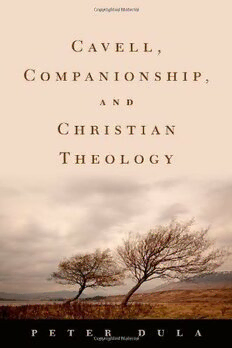
Cavell, Companionship, and Christian Theology PDF
Preview Cavell, Companionship, and Christian Theology
Cavell, Companionship, and Christian Theology REFLECTION AND THEORY IN THE STUDY OF RELIGION SERIES Series Editor Theodore M. Vial, Jr., Iliff School of Theology A Publication Series of The American Academy of Religion and Oxford University Press LESSING’S PHILOSOPHY OF RELIGION AND THE GERMAN ENLIGHTENMENT Toshimasa Yasukata AMERICAN PRAGMATISM A Religious Genealogy M. Gail Hamner OPTING FOR THE MARGINS Postmodernity and Liberation in Christian Theology Edited by Joerg Rieger MAKING MAGIC Religion, Magic, and Science in the Modern World Randall Styers THE METAPHYSICS OF DANTE’s COMEDY Christian Moevs PILGRIMAGE OF LOVE Moltmann on the Trinity and Christian Life Joy Ann McDougall MORAL CREATIVITY Paul Ricoeur and the Poetics of Moral Life John Wall MELANCHOLIC FREEDOM Agency and the Spirit of Politics David Kyuman Kim FEMINIST THEOLOGY AND THE CHALLENGE OF DIFFERENCE Margaret D. Kamitsuka PLATO’s GHOST Spiritualism in the American Renaissance Cathy Gutierrez TOWARD A GENEROUS ORTHODOXY Prospects for Hans Frei’s Postliberal Theology Jason A. Springs CAVELL, COMPANIONSHIP, AND CHRISTIAN THEOLOGY Peter Dula Cavell, Companionship, and Christian Theology PETER DULA 1 2011 1 Oxford University Press, Inc., publishes works that further Oxford University’s objective of excellence in research, scholarship, and education. Oxford New York Auckland Cape Town Dar es Salaam Hong Kong Karachi Kuala Lumpur Madrid Melbourne Mexico City Nairobi New Delhi Shanghai Taipei Toronto With offi ces in Argentina Austria Brazil Chile Czech Republic France Greece Guatemala Hungary Italy Japan Poland Portugal Singapore South Korea Switzerland Thailand Turkey Ukraine Vietnam Copyright © 2011 by Oxford University Press, Inc. Published by Oxford University Press, Inc. 198 Madison Avenue, New York, New York 10016 www.oup.com Oxford is a registered trademark of Oxford University Press All rights reserved. No part of this publication may be reproduced, stored in a retrieval system, or transmitted, in any form or by any means, electronic, mechanical, photocopying, recording, or otherwise, without the prior permission of Oxford University Press. Library of Congress Cataloging-in-Publication Data Dula, Peter, 1970– Cavell, companionship, and Christian theology / Peter Dula. p. cm.—(Refl ection and theory in the study of religion series) Includes bibliographical references (p. ). ISBN 978–0–19–539503–7 1. Cavell, Stanley, 1926– 2. Philosophy and religion. 3. Church. I. Title. B945.C274D86 2010 191—dc22 2010000842 The lines from “Transcendental Etude,” Poem VII of “Twenty-One Love Poems,” from The Dream of Common Language: Poems of 1974–1977, by Adrienne Rich. Copyright © 1978 by W. W. Norton & Company, Inc. Used by permission of the author and W. W. Norton & Company, Inc. 9 8 7 6 5 4 3 2 1 Printed in the United States of America on acid-free paper Friendship requires that rare mean betwixt likeness and unlikeness. . . . I am equally balked by antagonism and by compliance. Let him not cease an instant to be himself. The only joy I have in his being mine, is that the not mine is mine . . . . Better be a nettle in the side of your friend than his echo. . . . Let it be an alliance of two large, formidable natures, mutually beheld, mutually feared, before yet they recognize the deep identity which beneath these disparities unites them. . . . Guard him as thy counterpart. Let him be to thee for ever a sort of beautiful enemy, untamable, devoutly revered, and not a trivial conve- niency to be soon outgrown and cast aside. —Ralph Waldo Emerson, “Friendship” This page intentionally left blank Contents The Ordinary: An Introduction to Stanley Cavell, 3 Part I 1. Companionship and Community in Cavell and MacIntyre, 33 2. Scenes of Instruction in Cavell and Liberalism, 57 3. Private Languages in Cavell and Sebald, 75 4. Fugitive Ecclesia, 95 Part II 5. The Claim of Reason ’s Apophatic Anthropology, 117 6. “Can We Believe All This?”: Cavell’s Annexation of Theology, 155 7. Evidence of Habitation, 179 8. Truly Human, 209 Conclusion, 223 Notes, 231 Bibliography, 267 Index, 275 This page intentionally left blank Preface Theology has always been in conversation with philosophy. Those conversations can be amicable, antagonistic, illuminating, uncomprehending. In the English-speaking world in recent decades, those conversations have been wide ranging. But few theologians have taken up the work of the man Richard Rorty referred to as “the least defended, the gutsiest, the most vulnerable” of American philosophers—Stanley Cavell.1 As the analytic tradition came under increasing pressure in the late twentieth century, its mid-century orthodoxies increasingly worn, those challenging it or those on its fringes became important resources. Theologians, in particular, welcomed neo-Aristotelianism, pragmatism, and poststructuralism. But somehow Cavell got missed, allowed to fall through the cracks between, say, Dewey and Derrida. Cavell’s relative obscurity in philosophy departments is perhaps not surprising. Cavell wrote books on Emerson and Thoreau, a book on Shakespeare, and three books on fi lm and, to the annoyance of many colleagues, called them all philosophy. His repeated gestures toward theology didn’t help him in many philosophical circles, but they do make the theologians’ lack of interest all the more disturbing. Like a few of the French postmodernists, and unlike the Anglo-American analytical philosophers, Cavell cannot let go of the issue of faith. He once told an interviewer, “To choose between Judaism and Christianity is, I suppose, still a live issue for me.”2 Cavell is fascinated
